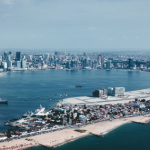The Society for Planet and Prosperity (SPP) Project Lead / Senior Policy Analyst, Gboyega Olorunfemi has called for a focused leadership by regional institutions in strengthening Early warning Climate Resilience and Human Mobility Systems in West Africa.
This call was made while speaking at the side event organised by the Economic Community of West African States (ECOWAS) in collaboration with the German Agency for International Cooperation (GIZ), the International Organization for Migration (IOM), and AGRHYMET Regional Centre at COP30 in Belem, Brazil.
Responding to a question on what ECOWAS Member States are expecting from regional institutions in term of support to integrate climate mobility into national adaptation plans (NAPs) and policies, Mr. Olorunfemi stated that regional bodies need to be intentional and strategic in mainstreaming climate policies across the region by playing a central role which goes beyond acting as advisory bodies, but actively ensuring that national development documents comply with existing regional frameworks, are technically sound, and are designed and used as investable political instruments that can attract project financing for both national and regional growth.
“Regional bodies must be intentional and strategic,” Mr. Olorunfemi said. “They should encourage collaboration among countries, conduct a synthesis of all submitted NAPs to assess integration of Early Warning Systems and climate mobility, and use that analysis to identify gaps.”
Olorunfemi enjoined regional institution to rally technical assistance for member states to drive efficiency and to effectively integrate Measurement and Evaluation mechanism in their respective project implementation.
In reacting to a question on failures of early warning systems on flooding, Olorunfemi emphasised that the Local government leadership be designated and empowered as first responder, the channel of communicating warnings must be improved and ensure it get to the right people in the right form and language.
He further highlights the need for provision of adequate infrastructure for evacuation to designated make shift camps, while encouraging government to build trust with people living in the vulnerable planes through continuous sensitisation and advocacy. “No life is worth losing to flooding when it is avoidable” he said.
With COP30 spotlighting implementation and resilience, the discussion took place in the context of intensifying climate impacts across West Africa, where communities are facing increasing risks of displacement, migration, and loss of livelihoods, with women disproportionately affected due to limited access to early warning information and adaptation resources which continue to constrain evidence-based and equitable responses.
The event which highlighted how integrated early warning and climate mobility systems can drive anticipatory action, enhance cross-border cooperation, and build long-term climate resilience, and the role of regional bodies in coordinating these efforts had in the panel Dr. Raoul Koumane, ECOWAS; Dr. Boubacar Assoumana AGRHYMET; John Baki, Women Environment Programme (WEP); Darius ANKAMAH, Alliance for Youth in Climate Change Action (AYCCA); ECOWAS and was moderated by SODOKIN Komi Elom Claude, IOM.





